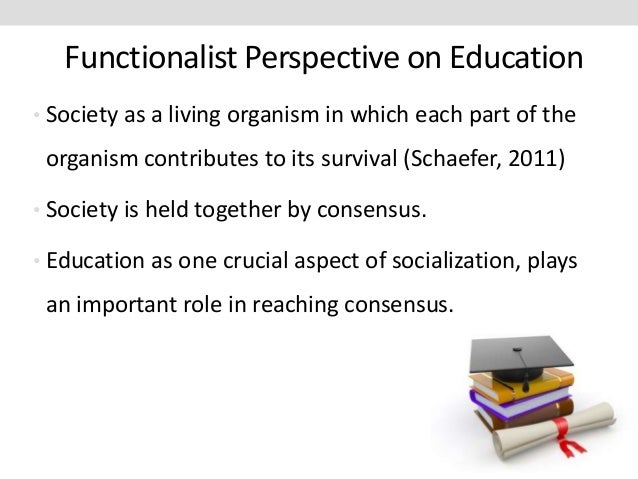Think about your own education journey. From the first day of kindergarten to your final exams, what was its primary purpose? Was it simply to acquire knowledge? To prepare for a future career? Or perhaps something more profound? The functionalist perspective in sociology offers a distinct lens through which to analyze the purpose and impact of education, considering it as a vital social institution that serves to maintain and perpetuate society itself.

Image: www.slideshare.net
This perspective, rooted in the works of Emile Durkheim and other early sociologists, views society as a complex organism, with each institution – including education – playing an essential role in its smooth functioning. It provides a framework for understanding how education contributes to social cohesion, social control, and the perpetuation of cultural values. But how does it work in practice, and what are its implications for individuals and society as a whole?
The Core Concepts of Functionalist Education
Socialization
Education serves as a primary agent of socialization. It’s not just about teaching math, science, and reading; it’s about imparting shared values, norms, and beliefs that are essential for a society to function. Through the classroom, school rules, and interactions with peers and teachers, students learn to respect authority, follow rules, and develop social skills necessary for navigating the broader social landscape. This process helps individuals understand their roles and responsibilities within society, ensuring societal cohesion.
Social Control
Beyond socialization, education plays a crucial role in maintaining social control. It instills discipline, instills respect for authority, and encourages conformity to societal norms. Schools, through their rules, regulations, and expectations, provide a microcosm of the larger social order that students are expected to internalize and follow. This framework prepares individuals to abide by the legal and social norms of society, minimizing social deviance and promoting a stable social order.

Image: cupsoguepictures.com
Skill Development and Economic Function
Functionalists also emphasize the economic function of education. In a modern society, specialized skills and knowledge are essential for a thriving workforce. Education prepares individuals for specific roles in the workforce by equipping them with the necessary knowledge, skills, and values. It helps individuals contribute to the economy and ensures continued economic development. The functionalist perspective sees this economic role as crucial for societal stability.
Cultural Transmission
Education is not merely about transmitting factual knowledge; it also functions as a vehicle for transmitting cultural heritage. Through history lessons, literature, and even informal interactions within the school environment, students learn about their culture’s past, present, and values. The functionalist perspective argues that this transmission of cultural knowledge is essential for maintaining social continuity and preserving cultural identity. This helps to ensure a shared sense of belonging among society’s members.
Real-World Applications
The functionalist perspective provides a useful framework for understanding various educational phenomena. For example:
- The rise of standardized testing: The emphasis on standardized tests, particularly in the United States, aligns with the functionalist view of education as a mechanism for selecting and sorting individuals for future roles in society. These tests can be seen as measures of individual potential and merit, helping to allocate individuals to appropriate positions in the workforce and social hierarchy.
- The role of vocational training: Vocational training programs, which focus on practical skills and knowledge needed for specific jobs, fit squarely within the functionalist model. They are designed to prepare individuals for immediate entry into the workforce, filling the specific needs of employers and contributing to the economy.
- The importance of curriculum design: Educational systems around the world devote significant resources to curriculum development, ensuring that the content aligns with societal values and needs. From the functionalist perspective, this practice is essential for teaching students the knowledge and skills necessary to become productive members of society.
Criticisms of the Functionalist Perspective
While the functionalist perspective offers insights into the role of education in society, it has been criticized for its limited scope and potential to overshadow other important factors. Some common criticisms include:
- Overemphasis on consensus: The functionalist perspective assumes that social harmony and consensus are the primary goals of education, downplaying the possibility of conflict or inequality. This can lead to overlooking how power dynamics and social structures can actually perpetuate existing inequalities through education.
- Ignoring individual agency: Critics argue that the functionalist perspective paints a picture of education as a deterministic force, failing to recognize the agency and choices that individuals make within the system. Students, teachers, and parents can influence the educational process in ways not always captured by the functionalist perspective.
- Ignoring the role of social change: The functionalist perspective tends to view education as a conservative force that maintains the status quo. It often overlooks how education can also be a catalyst for social change, empowering individuals to challenge existing structures and advocate for reform.
The Future of Education: A Functionalist Perspective
In the face of rapid technological advancements, globalization, and evolving societal needs, the functionalist perspective on education suggests the need for continuous adaptation. Educational systems must adapt to prepare individuals for a future workplace that is increasingly complex, dynamic, and driven by technological innovation. This includes fostering skills such as critical thinking, problem-solving, adaptability, and lifelong learning. Moreover, the need to promote social cohesion and cultural understanding remains paramount, particularly in a world increasingly characterized by diversity and interconnectedness.
Functionalist Perspective Education
Conclusion
The functionalist perspective on education provides a valuable lens for understanding how this essential institution contributes to the smooth functioning of society. By promoting socialization, social control, skill development, and cultural transmission, education plays a vital role in shaping individuals and sustaining societal order. While the functionalist perspective has limitations, it offers a crucial framework for analyzing the ways in which education interacts with the broader social context, informing our understanding of its multifaceted role and potential for adaptation in the face of ever-changing societal needs. As you continue your own educational journey, consider the diverse functions that education serves in your life and society at large.

:max_bytes(150000):strip_icc()/OrangeGloEverydayHardwoodFloorCleaner22oz-5a95a4dd04d1cf0037cbd59c.jpeg?w=740&resize=740,414&ssl=1)




